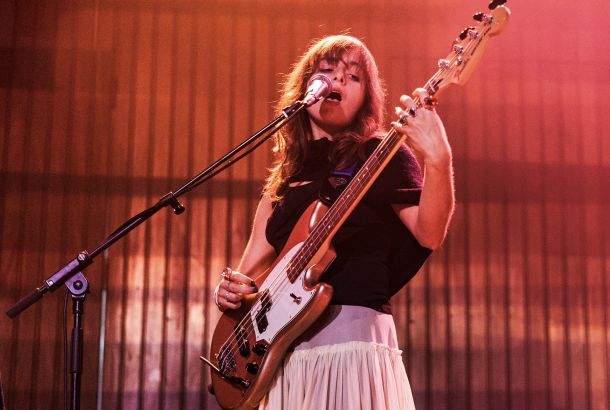‘The shrill from the terraces’: Tracks that define the beautiful game for me

There are perhaps no two elements of British culture quite so interlinked as football and music. From the shrill of a terrace on a Saturday afternoon belting out chants to the tune of classical pieces such as Elmer Bernstein’s ‘The Great Escape’, to the endless amount of grime and drill lyrics which reference Premier League players from the noughties – the beautiful game and Britain’s music scene are undoubtedly joined at the hip.
Such a pattern has only been accentuated in recent years with the rise of social media platform TikTok. As the online network has brought about the emergence of a new footballing subculture known as ‘lemon boy’.
This sees young men – usually somewhere between the ages of fourteen and eighteen – who attend football, dress in a style harking back to the dark ages of football hooliganism in the 1980s. Wearing brands such as Aquascutum and Fred Perry, and listening to much of the music that has characterised that era, with tracks by two-tone bands such as Madness and ‘Madchester’ groups such as The Stone Roses now frequently being used as TikTok sounds, and attracting a much younger audience to buy their merchandise and attend concerts. The name of the subculture in part derives itself from the motif of a lemon that was present on many of The Stone Roses’ posters and album covers.

While a group of year-eleven-aged boys living out some kind of football hooligan fantasy is certainly cringe-inducing, the way in which football – and the culture surrounding it – has enabled a whole new generation to connect with the music of their parents’ upbringing is nonetheless a powerful process. Something that greatly motivated me to highlight the songs that have defined the times I have spent attending football matches from a young age, and the stories they are able to tell about my and my family’s lives.
‘Just Can’t Get Enough’ by Depeche Mode
Depeche Mode are a band that will always hold a special place in my heart; as possibly the most famous musical sons of my native Essex, they have produced a variety of ethereal hits, a personal favourite of mine being the engaging tale of heartbreak and longing for the past that is ‘See You’. However, it is their synth-pop floor-filler ‘Just Can’t Get Enough’, that will always link heavily to thoughts and memories surrounding football.
Throughout my childhood, I spent a large span of time following my local and beloved non-league side, Hornchurch FC. Meaning that many a Saturday afternoon throughout autumn, winter and spring, were spent standing on the ramshackle terraces of lower-league football grounds, with smells of hand-rolled tobacco and burger vans intoxicating my adolescent nostrils, cheering on the Urchins.

Every week, without fail, at whatever non-league ground I may be at, as the clock struck 2:59pm and the players became visible in the tunnel, Dave Gahn’s voice singing of slipping and sliding into love, backed up by Martin Gore on the synthesiser, would blare out over the crackly, 1990s era speakers, helping to alert the few hundred fans that footballing action was imminent. Before eventually being interjected by a heavily-tattooed, 60-something stadium announcer with a distinctly raspy and Embassy Signature-infused voice, notifying everyone how Sean Marks and Leon McKenzie would be starting upfront.
For that reason, this will always be a song I associate with the beautiful game.
‘The Sacred War’ by V. Lebedev-Kumach & A. Alexandrov
On a gloriously sunny afternoon in late May 2021, Hornchurch FC were crowned FA Trophy champions, making us the undisputed best non-league side in the country. Our players put in a second-to-none performance – albeit with the help of some debatable refereeing decisions – to beat Hereford 3-1 at Wembley. The London Borough of Havering had conquered the nation.
Having returned from Wembley, and had multiple celebratory underage drinks at a curry house on my local high street, my friends and I went in search of more alcohol, desperate to continue one of our first proper nights on the town after the COVID-19 lockdown.
It was then that one of my severely inebriated friends decided to belt out a searing rendition of ‘The Sacred War’ – a Second World War-era Soviet battle song we had learnt about as part of our History A-level – in front of a crowd of onlookers, in a truly random and bizarre moment that has gone down in the folklore of our friend group.

The song choice seemed out of place at the time, yet in hindsight, there is in fact something deeply fitting about a song detailing the Soviet Red Army’s triumphs at Leningrad and Kursk, being sung as a result of the Hornchurch Red Army’s glorious victory in North-West London.
‘Babylon’ by David Gray
There is no doubt that David Gray’s 1999 hit is an all-time classic. A song that deserves a spot on any playlist that attempts to succinctly capture the ‘turn of the millennium’ era from which it is drawn, and that can instantly transport anyone of my generation back to Saturday mornings spent with their parents either driving to a retail park or some kind of extracurricular activity.
Yet for me, rather strangely, this song will always hold a connection with a major turning point in the history of West Ham United, and a moment that would come to define the club.
The date was the 7th of August 2016, West Ham were about to play their first proper home game at their new ground, the London Stadium – the former being the Olympic Stadium in Stratford, to the east of the capital, that three years earlier the club had secured a 99-year lease over – and as my dad and I drove to our local station, ready to catch the District Line to the game, I have a vague yet oddly distinct memory of this song playing on the radio.

The match-up itself would go on to be rather indistinct, a typically ridiculous pre-season friendly that saw Paulo Dybala and Andy Carroll appear on the same score sheet, a borderline hallucination. The reason for which the game is remembered by the majority of the fanbase is that it was the commencement of hostilities surrounding the stadium relocation.
Yet for me, all the controversy that has followed, surrounding whether the change of stadium has ripped the soul out of the club or brought it forward, will always be seamlessly intertwined with Gray’s throaty voice recounting his experiences of all the lights in London.
‘Down Under’ by Luude (featuring Colin Hay)
In the vast majority of cases, intense electronic dance music is not usually my thing. At the odd festival on a hot summer’s afternoon, or over the course of an alcohol-infused night at a commercial club, it may well be, but the genre is not something that regularly dominates my playlists.
The 2021-2022 season marked a new frontier in the history of West Ham United. The club, for the first time since the early 1980s, had found itself in the latter stages of a European competition and in a rare turn of events, there was an incredibly positive feel around the club.
The fate of the draw had decided that over two Thursday nights in April, we would face French side Lyon in the Quarter-Finals of the Europa League. As a lifelong fan, this was not something I was going to miss. Giddy with excitement, and in spite of the fact I would be starting my A-levels a few weeks later, I had pushed aside all else to make the home leg of the tie.
Upon arrival at The Carpenters Arms, a suitably horrible East End boozer just off Stratford High Street, and a pre-match haunt of many West Ham fans, my friends and I immediately made a b-line for the bar in desperate need of drinks to drown the pre-match nerves. Yet in a horrible turn of events that would break a personal record, the queue at the bar was so long that it took me over 45 minutes to get served, as the ‘Down Under’ remix was insufferably blasted in my ears.
Since that day, I have hated electronic dance music even more.

‘The Way It Is’ by Bruce Hornsby and The Range
However prepared you may think you are for university, you almost certainly aren’t prepared enough. This was a realisation that hit me on the 18th of September 2022.
Having been dropped off by my parents at my new flat in Richmond Park the day before, I was in somewhat of a bad state on an early morning Transpennine Express service from Oxford Road to Liverpool Lime Street, on my way to watch West Ham take on Everton at Goodison Park.

I was severely sleep deprived – as a result of an impromptu flat party downstairs directly beneath my bedroom the night before – and in a position of unbelievable insecurity, I was a long way from home and completely alone, facing a new frontier, for the first time in my life. Hornsby’s melancholic voice talking of society’s ills and the world’s pervasive sense of sadness seemed to aptly speak to my somewhat self-pitying mood on that Sunday morning.
Things didn’t improve over the course of that day, we lost 1-0, falling victim to Neal Maupay’s only Everton goal.







